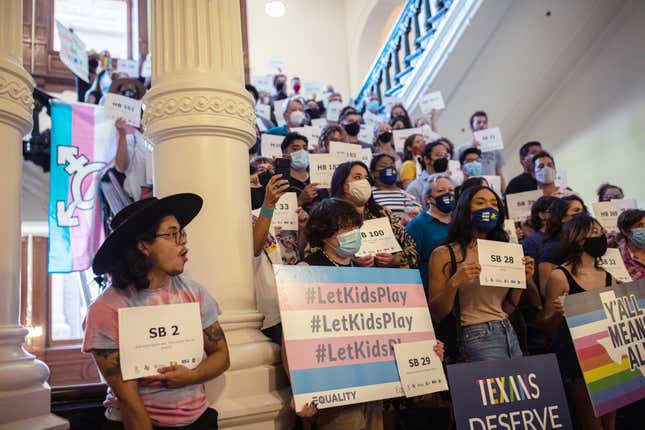Please, Texas Republicans, Stop Trying To Kill Queer Kids
The state took down a suicide prevention website for LGBTQ youth and is pushing policies proven to hurt them. Why?
Politics

According to the National Suicide Prevention Lifeline, suicide is the second leading cause of death among people aged 10 to 24. And for years, studies have shown particularly high rates of suicidal ideation and attempts among LGBTQ youth. The Trevor Project, which provides mental health support and advocacy for LGBTQ youth, estimates that more than 1.8 million LGBTQ between the ages of 13 and 24 seriously consider suicide every year in the United States. At least one attempts suicide every 45 seconds.
All of this makes it particularly enraging that the Texas state agency responsible for child welfare took down a website offering resources to LGBTQ youth, including a suicide prevention hotline, simply because a craven, shitty Republican politician kicked up a shitty little fuss about it on Twitter.
Internal communication obtained by the Houston Chronicle and the Texas Tribune showed that after one-term Republican State Senator Don Huffines, an arch-conservative challenging Gov. Greg Abbott from his right, posted a video message accusing the Texas Department of Family and Protective Services of “promoting transgender sexual policies to Texas youth,” DFPS staffers worried that it was “starting to blow up on Twitter” and ultimately strategized to take the entire webpage down—despite at least one staffer acknowledging that such content had been provided “for as long as I can remember.” In other words, this is a slimy attempt by Abbott to preserve his power by pandering to Texans who hate trans kids.
I reached out to the Trevor Project about the Tribune story, and they pointed out that LGBTQ youth are overrepresented in the child welfare system nationally, and youth who have experience in the foster care system report significantly high rates of attempting suicide.
“It is unconscionable that the Texas state government would actively remove vital suicide prevention resources from its website for the sole purpose of appeasing a rival politician. Mental health and suicide prevention are nonpartisan,” said Casey Pick (she/her), Senior Fellow for Advocacy and Government Affairs at The Trevor Project. “This story sends a terrible message to LGBTQ youth in Texas and will only contribute to the internalization of stigma and shame. We should be expanding access to support services for this group, not erasing what resources LGBTQ youth have to reach out for help.”
Texas is one of at least 10 states pushing to deny gender-affirming care to trans youth. In August, the same agency that took down the suicide prevention resources for LGBTQ foster kids told Gov. Abbott that gender-confirming surgeries for transgender children constitute child abuse, despite the fact that such surgeries are almost never provided to children. Reversible alternatives like puberty blockers and social transitioning are far more common.
Discriminatory policies, and experiences such as conversion therapy, are linked with increased suicidality. Conversely, research shows that gender-affirming care, such as puberty blockers, is linked with decreased likelihood of attempted suicide. Legalizing same sex marriage has been linked to fewer youth suicide attempts.
Simply put, progressive policies around LGBTQ health and rights save lives, while the policies that Republicans are promoting hurt and, ultimately, kill children.
For a long time, it was common practice not to discuss any potential cause of a public suicide. There was a fear that doing so would lead people in similar circumstances to suicide, to feeling that ending their life was justified. But we can’t ignore that we are legislating that justification to trans youth across the country when we deny them healthcare, or access to after school sports, or otherwise treat them like there is something fundamentally undesirable about their existence—rather than acknowledging the reality, which is that there is something deeply fundamentally wrong with any adult who would seek to make a child’s life more difficult for any reason, let alone on the basis of their gender identity or sexual orientation. No one promoting these policies should ever be able to claim they are “pro-life.”
-

-

-

-

-

-

-

-

-

-

-

-

-

-

-

-

-

-

-

-

-

-

-

-

-

-

-

-

-

-

-

-

-

-

-

-

-

-

-

-








































